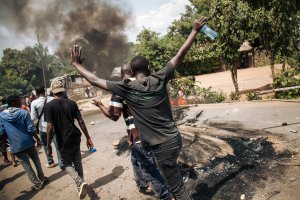Police in eastern Congo fired live ammunition and tear gas on Thursday to disperse more than 100 people protesting a presidential election delay, blamed on a deadly Ebola outbreak, that means more than 1 million votes will not count. Some protesters set up blazing street barricades and attacked an Ebola isolation center, with nearly 20 patients fleeing.
The attack poses yet another challenge to virus containment efforts in a region, long traumatized by rebels, that had never faced an Ebola outbreak before. Some residents continue to believe Ebola is just an excuse to disrupt the vote. Most of the patients who fled had tested negative for the virus, a health ministry spokeswoman said.
The unrest in Beni occurred a day after Congo’s electoral commission announced that Sunday’s election is delayed until March for Beni and Butembo city because of the outbreak. The rest of the country still votes on Sunday, with “definitive” results announced on Jan. 15 and the inauguration three days later.
Opposition candidates call the delay a ploy to hurt their chances at the polls in areas where sentiment has turned against the ruling party in recent years. The opposition coalition behind presidential candidate Martin Fayulu called for a “ghost town” strike throughout Congo on Friday to protest, with no one going to work.
The reasons given for the delay aren’t credible, Fayulu told The Associated Press, saying he has visited the Ebola zone and life “is as usual.” He called on all Congolese to remain calm and vote without violence.
Angry protesters in Beni marched to the local election office demanding the right to vote on Sunday with the rest of the country. Others chanted for longtime President Joseph Kabila to go. Kabila has said he is stepping aside after the election, which has been delayed for more than two years amid sometimes deadly protests. He backs a ruling party candidate, Emmanuel Ramazani Shadary, but many Congolese believe Kabila will wield power behind the scenes.
The protesters also demanded that the electoral commission’s president resign.
“We will continue with our marches until (commission president Corneille Nangaa) and his entourage let us vote because it is our right as Congolese,” said Clovis Mutsuva with the LUCHA activist organization.
“We participated in campaigning and there were no Ebola infections,” Mutsuva added. “Why can a single day of voting cancel the elections for us?” School, church and other activities have continued despite the Ebola outbreak.
Worryingly, Mutsuva said they didn’t believe Ebola had existed in Beni: “They came with this disease to barricade the elections.”
The election already had been pushed from Dec. 23 to Sunday after a fire in the capital, Kinshasa, destroyed voting materials. Congo has some 40 million registered voters who will decide the fate of a vast country rich in mineral wealth but desperately poor in infrastructure and basic services.

The latest delay has caused fresh frustration in Beni, where rebel attacks have killed more than 1,500 people in the past four years. Such attacks have hurt efforts to contain the Ebola outbreak, which since being declared Aug. 1 has seen 585 cases, including 308 confirmed deaths.
The insecurity has complicated efforts to trace all suspected contacts of Ebola victims in a densely populated region where more than a million people already had been displaced.
Congo’s health minister, Dr. Oly Ilunga, has called this Ebola outbreak the most complex in history with the rebel threat and bouts of community resistance. In an interview with the AP on Dec. 20, however, he said decisions about holding the election in the Ebola zone had been made with electoral authorities, and sought to calm concerns.
The Ebola virus is spread via infected bodily fluids, and some have worried about using the touchscreens of voting machines. The health minister said precautions had been taken. Several tons of hand sanitizer were deployed for use in polling stations, and voters were to be screened for fever before entering polling stations.













